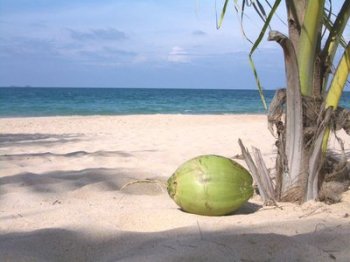
Among these is the setting up of a new integrated plant in Savusavu that will make an array of coconut products from the much-in-demand virgin coconut oil (VCO) to desiccated coconut and cosmetics and wellness products. Copra Millers plans to export a significant portion of its production.
“Machinery for the plant is in place and the manufacturing is expected to begin toward the end of October,” says John Deo, Acting General Manager of Copra Millers Fiji. “A coconut products specialist has been roped in from India’s southern state of Kerala, one of the world’s largest growers of coconuts, on a three-year contract to install and run the plant.”
Creating a range of value-added products is part of the strategy. Desiccated coconut, coconut milk powder and other food and beverage products derived from the versatile coconut will be added to the product mix in the coming months, Deo said.
Soaps, massage oils, skincare oils and creams as well as several more wellness products all with attractive branding and the ‘Fiji Made’ logo will begin to roll out of the integrated plant some time next year. Some products like the coconut soap will be handmade and be marketed as premium products.
VCO will be produced using cold press technology, where no chemicals, heat or additional processing are used therefore preserving the natural nutrients, antioxidants and the important lauric acid component naturally present in the oil, which is believed to possess anti-viral and anti-microbial properties once metabolised in the human body. The manufacturing processes are designed to maintain the presence of biologically active components. The factory is Hazard Analysis Critical Control Point (HACCP) compliant and accredited. Staff are provided with a HACCP Australia Training Certificate in recognition of the level of training attended.
The Savusavu factory has been in existence for several years and its main products has been raw coconut oil, which it has been exporting to South East Asian countries and Taiwan. This market comprises 90 per cent of its export and at its peak it exported 200 tonnes a month, but like much of Fiji’s agribusiness sector, Copra Millers Fiji has also been badly affected by Cyclone Winston and currently exports are down to just 120 tonnes a month and climbing slowly. It also produces coconut water. The factory celebrated World Coconut Day earlier this month.
Ian Furlong, Pacific Trade & Invest (PT&I) Trade Development Manager in Auckland, said PT&I is very happy to be of assistance to Copra Millers Fiji. “We were able to provide marketing advice for the VCO product which was about creating a story about the product, including it on the labelling and ensuring that the packaging was designed for easy access to the product as in colder climates such as New Zealand, where the VCO can easily solidify.”
In addition, PT&I has also provided Deo with several prospective customer contacts in New Zealand for VCO and also a prospective customer for coconut flour to be used in the production of dairy-free vegan parmesan speciality products, Furlong revealed.
The SOE has the involvement of two Government ministries. The Ministry of Public Enterprises oversees the manufacturing, infrastructure and investment side of the business while the Ministry of Agriculture looks after agricultural matters. The driver behind investing in the new integrated plant and starting production of VCO on the back of growing worldwide demand was primarily to revitalise the Fiji Coconut Industry and to enhance and empower the lives of ordinary coconuts farmers in Fiji, he adds.
Being an SOE gives the business social responsibility imperatives. “We are different from other enterprises from the private sector because we work closely with communities across the country, women’s groups and other disadvantaged sections of society,” Deo said.
Switching from accepting copra to the whole coconut as the raw material has been quite the game changer in encouraging replanting, according to Deo. The new machinery automatically husks coconuts, thereby taking the physical drudgery out of farmers individually husking them, which is a disincentive given the time and physical energy that is required. Moreover, the husk is used as fuel to fire the driers.
This strategy has enabled the farmers to shift away from traditional labour intensive work on copra production to simply collecting whole nuts for a higher value.
“It has actually encouraged replanting,” Deo said. “There has been no effective replanting since the 1960s. Systematic replanting is happening now as more and more farmers and communities see coconut farming as a viable business. One million plantings are being undertaken every year in a five-year programme. The fruiting cycle is three to five years.”
One of the disincentives for coconut planting down the decades has been the unpredictability of devastating cyclones that often decimate entire groves. To address this, the Fiji Tall variety of coconut tree, which is known to be cyclone-resistant is being planted, Deo said. Planting is happening across the country including in the outer islands of Lomaiviti and other smaller and far flung maritime islands.
As the management and staff at Copra Millers Fiji and the coconut industry in Fiji look forward to the opening of the new integrated coconut plant in Savusavu, PT&I wishes them all the very best for the commencement of production in October, Furlong said.
Source: PT&I



 Classifieds
Classifieds

